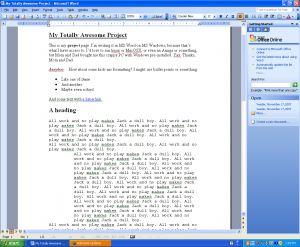yes, [HTML5](http://en.wikipedia.org/wiki/HTML5) is essentially a diluted buzzword for “something shiny on the web that doesn’t use flash” – BUT – by using standards, you get to have content used in ways you haven’t predicted. For instance, [Grant Hutchinson](http://www.splorp.com/) has been playing with a [Newton-powered webserver](http://splorp.com/newton/) (not linking directly to the server to spare it from the network) for years.
Today, he fired up the web browser on one of his Newtons, and pointed it at the [Apple HTML5 showcase site](http://www.apple.com/html5/). What happened? Fireworks? Crashes? Missing content? Plugin Required error messages?
Nope.
The content displayed just fine, as best as could be handled by a 15 year old handheld computer. Sure, some of the bells and whistles are missing. But the site is usable.
Standards, especially ones that support graceful degradation of presentation by devices at runtime, ensure we have access to our content long after it’s built, on devices we didn’t have in mind when we built it.
If Grant were to try to view any of the content I built years ago using Director/Shockwave, or any of 47 terabytes of content built in Flash, the poor little Newton would have barfed violently.
Opaque, proprietary formats are bad. Open standards and degradable presentation are good.





